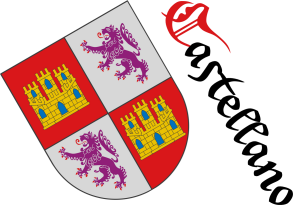
![Ver [Menéndez Pidal de Navascués, F.; 1988] en referencias bibliográficas. Libro abierto, hojas de plata, filo de oro, guardas de gules, tapas de sable.](../css/Libro.Bibliografia.png)
Menéndez Pidal de Navascués, F.; 1988
Faustino Menéndez Pidal de Navascués, «Spanish Heraldic Panorama: Epochs and Regions in the Medieval Period», paper presented at the I Seminar on Heraldry and Genealogy, organized by the Zurita Chair of the Institución Fernando el Católico, in Zaragoza, on December 14 and 15, 1984, published in I Seminar on Heraldry and Genealogy, publication number 1.138 of the Institución Fernando el Católico, pages 5-21, Zaragoza, 1988.
Also published later in the Revista Príncipe de Viana, ISSN 0032-8472, year number 68, issue number 241, dedicated to the tribute to Faustino Menéndez Pidal de Navascués, pages 533-553, Government of Navarra, Institución Príncipe de Viana, Pamplona, 2007.
Bibliographical reference of century XX.
Author: Menéndez Pidal de Navascués, Faustino.
Bibliographic reference mentioned in the following articles:
External resource:
Internal resources: MenendezPidalDeNavascuesF1988.PanoramaHeraldicoEspanolEpocasYRegionesEnElPeriodoMedieval.pdf.


Alfonso IX of Leon
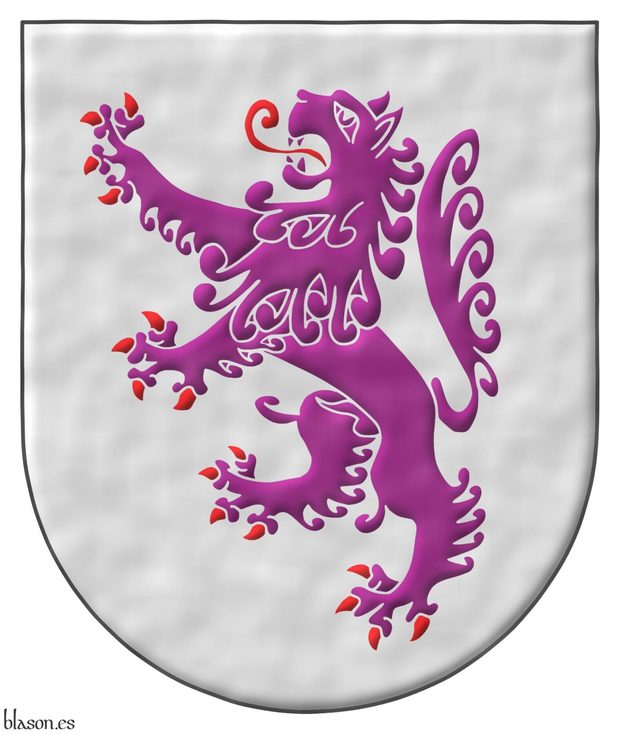
Born on August 15, 1171, in Zamora and died on September 24, 1230, in Sarria, Lugo.
Argent, a lion rampant Purpure, armed and langued Gules.
Escudo de plata, un león rampante de púrpura, armado y lampasado de gules.
Arms of the king of León interpreted by me as follows: the escutcheon is in a semi-circular arch; the field and the lion have been enameled and illuminated; and the ensemble has a watercolor finish.
This coat of arms of León can be seen, among many other places, for example, in [Argote de Molina, G.; 1588; chapter XLII].
Blazon keywords: Without divisions, Argent, Purpure, Gules, One, Lion, Rampant, Armed and Langued.
Style keywords: Semi-circular, Illuminated, Outlined in the field tincture and Watercolor.
Classification: Interpreted, Personal, Coat of arms and Kingdom of León.
Bearer: Alfonso IX of Leon.


Alfonso IX of Leon, open royal crown
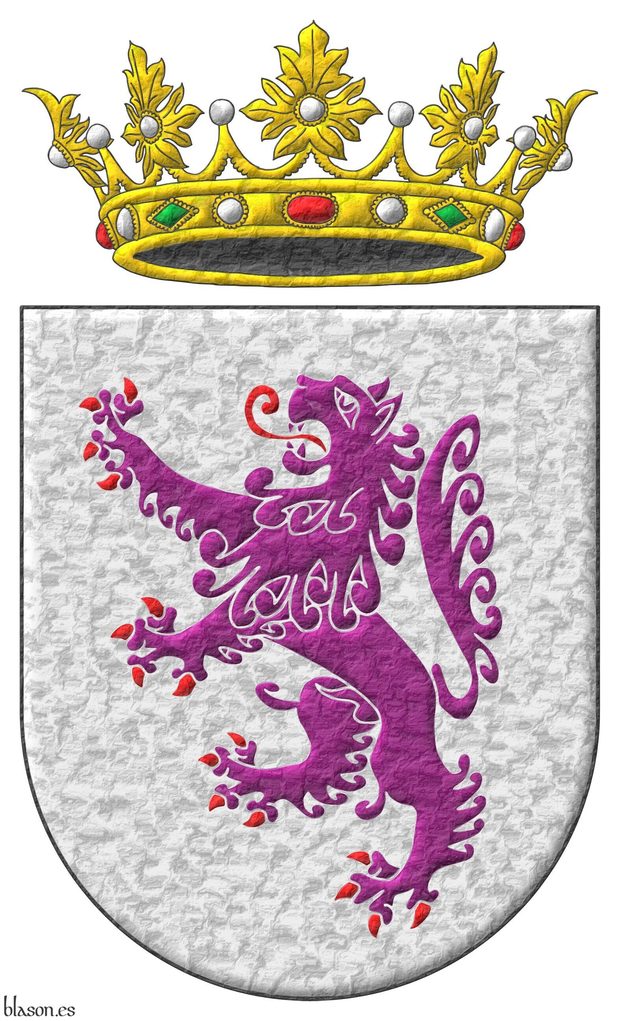
King of León from January 21, 1188, until his death on September 24, 1230.
Argent, a lion rampant Purpure, armed and langued Gules. Crest: An open royal crown Or.
Escudo de plata, un león rampante de púrpura, armado y lampasado de gules. Timbrado de una corona real abierta.
Arms of the King interpreted as follows: the escutcheon is finished in a semi-circular arch; both the field, the lion, and the crown of the crest have been illuminated; and the ensemble has a hammered metal finish.
Purple lion of the Kingdom of León
In the following image, I show a miniature from the Tumbo A of the Cathedral of Santiago de Compostela, from the 13th century, with the heading reading «Inclitus:Adeffonsus:Rex:Legionensium:et Gallecie:», combined with my interpretation of his coat of arms. The lion of the Kingdom of León can be found depicted in both purple and gules, but images like this confirm that it is purple, and I particularly favor the purple, as it makes it historically unique.
Blazon keywords: Without divisions, Argent, Purpure, Gules, One, Lion, Rampant, Armed, Langued, Crest, Open royal crown and Crown.
Style keywords: Semi-circular, Illuminated and Metal beaten.
Classification: Interpreted, Personal, Coat of arms and Kingdom of León.
Bearer: Alfonso IX of Leon.


Berenguela of Castile
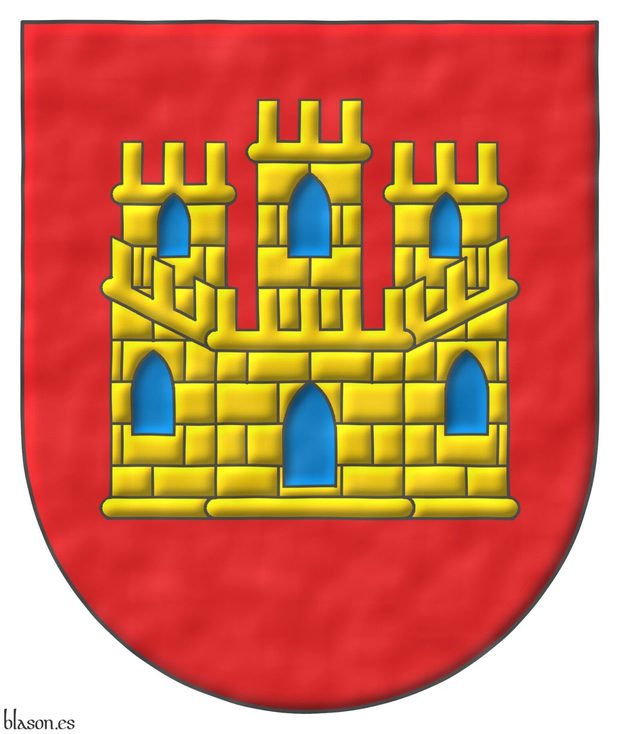
Born in 1179 in Segovia and died on November 8, 1246 in the Monastery of Las Huelgas in Burgos.
Gules, a castle triple towered Or, port and windows Azure, masoned Sable.
Escudo de gules, un castillo de oro, aclarado de azur, mazonado de sable.
Arms of the Queen of Castile, as interpreted by me: the shape of the shield is rounded; the field and the castle have been enamelled and illuminated; and the whole composition features a watercolor finish.
Blazon keywords: Without divisions, Gules, Or, Azure, Sable, One, Castle, Port and windows and Masoned.
Style keywords: Semi-circular, Illuminated, Outlined in sable and Watercolor.
Classification: Interpreted, Personal, Coat of arms and Kingdom of Castile.
Bearer: Berenguela of Castile.


Berenguela of Castile, open royal crown
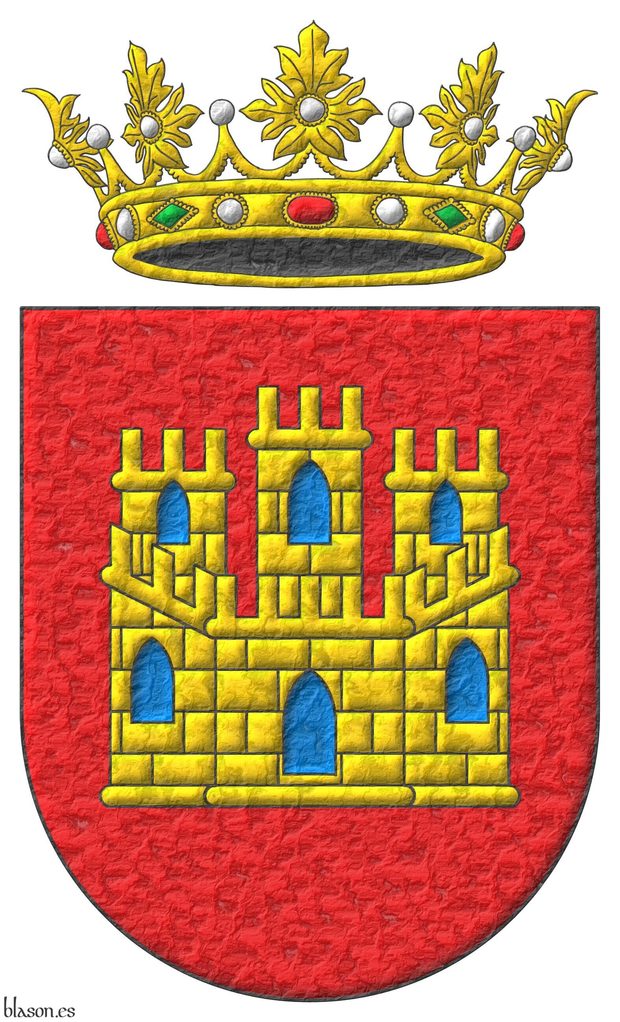
Queen of Castile during the year 1217 and queen consort of León from 1197 to 1204.
Gules, a castle triple towered Or, port and windows Azure, masoned Sable. Crest: An open royal crown Or.
Escudo de gules, un castillo de oro, aclarado de azur, mazonado de sable. Timbrado de una corona real abierta.
Arms of the Queen, as interpreted by me as follows: the shield's shape is finished with a rounded arch; both the field, the castle, and the crown have been illuminated; the castle and the crown are outlined; and the whole composition features a hammered metal finish.
Blazon keywords: Without divisions, Gules, Or, Azure, Sable, One, Castle, Port and windows, Masoned, Crest, Open royal crown and Crown.
Style keywords: Semi-circular, Illuminated, Outlined in sable and Metal beaten.
Classification: Interpreted, Personal, Coat of arms and Kingdom of Castile.
Bearer: Berenguela of Castile.


Berenguela of Castile and Alfonso IX
[ Argent, a lion rampant Purpure, armed and langued Gules ] accolé with [ Gules, a castle triple towered Or, port and windows Azure, masoned Sable ].
[ Escudo de plata, un león rampante de púrpura, armado y lampasado de gules ] acolado de un [ escudo de gules, un castillo de oro, aclarado de azur, mazonado de sable ].
Arms of the King of Leon and Queen of Castile, as interpreted by me with: the two shields shaped with rounded arches; the fields of both coat of arms, the lion, and the castle illuminated; and the whole composition featuring a watercolor finish.
Representation of the coats of arms of Alfonso IX of León and Berenguela of Castile as accolé arms ~ «escudos acolados». King Ferdinand III created his coat of arms, based on the coats of arms of his parents, through the marshalling of their arms ~ «composición de sus armas». For this purpose, the saintly king invented a type of composition, which later became widely used, known as quarterly ~ «cuartelado». Other ways to combine the coats of arms of two spouses are:
- Creating a new dimidiated shield ~ «dimidiado».
- Creating a new impaled shield ~ «partido».
- Adding one coat of arms to another as an escutcheon of pretence ~ «escusón de pretensión», in this case, rather than a claim, there was full ownership.
Blazon keywords: Without divisions, Argent, Purpure, Gules, One, Lion, Rampant, Armed, Langued, Or, Azure, Sable, Castle, Port and windows and Masoned.
Style keywords: Semi-circular, Outlined in sable, Tilted shield and Watercolor.
Classification: Interpreted, Personal, Accolé arms, Kingdom of Castile and Kingdom of León.
Bearer: Berenguela of Castile.


Alfonso VIII of Castile
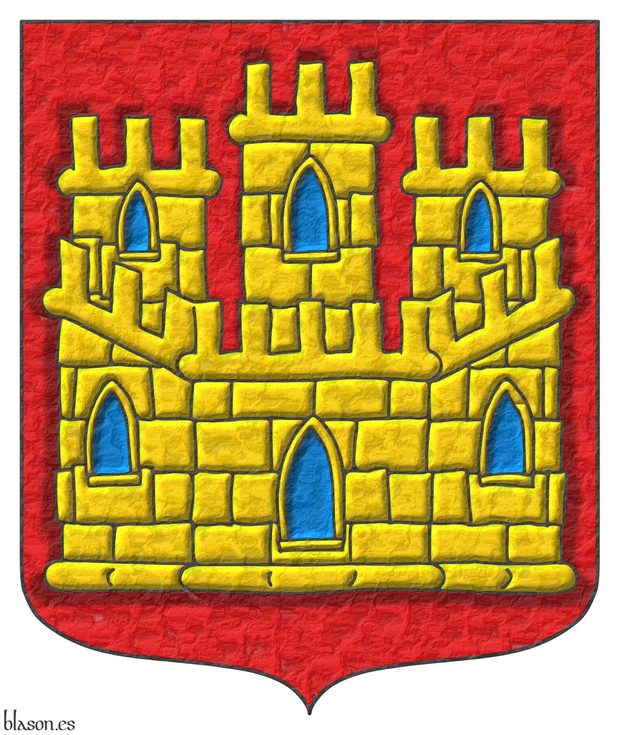
Born on November 11, 1155, in Soria and died on October 6, 1214, in Gutierre-Muñoz, Avila.
Gules, a castle triple towered Or, port and windows Azure, masoned Sable.
Escudo de gules, un castillo de oro, aclarado de azur, mazonado de sable.
Existing arms interpreted by me as follows: the shield’s shape is pointed and rounded; the field has been enameled Gules; the castle is outlined, illuminated, and shaded; the whole composition features a heavily hammered metal finish.
This ancient coat of arms of Castile can be consulted, among other sources, in [Argote de Molina, G.; 1588; chapter XLII].
Blazon keywords: Without divisions, Gules, Or, Azure, Sable, One, Castle, Port and windows and Masoned.
Style keywords: Ogee, Illuminated, Shaded, Outlined in sable and Hard metal.
Classification: Interpreted, Personal, Coat of arms and Kingdom of Castile.
Bearer: Alfonso VIII of Castile.


Alfonso VIII of Castile, royal crown
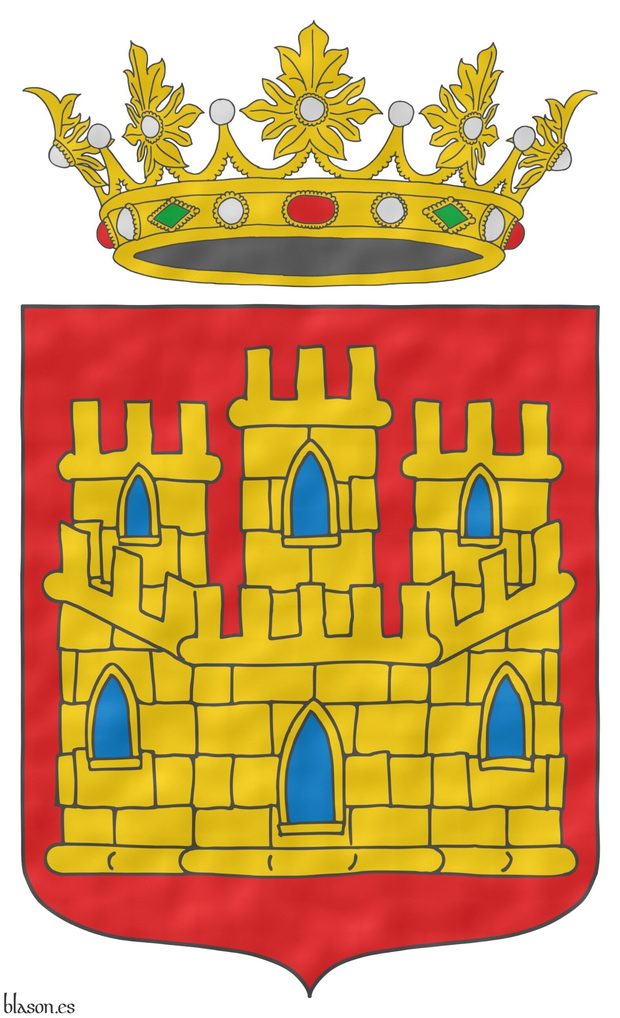
King of Castile from 1158 to 1214.
Gules, a castle triple towered Or, port and windows Azure, masoned Sable. Crest: An open royal crown Or.
Escudo de gules, un castillo de oro, aclarado de azur, mazonado de sable. Timbrado de una corona real abierta.
Arms of the king, as interpreted by me, as follows: the shield's shape is pointed and rounded; the field is enameled Gules; the castle is outlined in Sable; and the whole composition features a watercolor finish.
In [Valero de Bernabé, L.; 2009a; page 1] the author specifies the main characteristics of the «Castilian royal castle», which can be summarized as: «with three towers, the middle one taller, and the two flanking it identical», «each tower crowned with three battlements», «one to three doors and one or two pointed windows on each tower», and «masoned and battlemented», as also noted by the same author in [Valero de Bernabé, L.; 2009b; page 33].
Blazon keywords: Without divisions, Gules, Or, Azure, Sable, One, Castle, Port and windows, Masoned, Crest, Open royal crown and Crown.
Style keywords: Ogee, Plain tincture, Outlined in sable and Watercolor.
Classification: Interpreted, Personal, Coat of arms and Kingdom of Castile.
Bearer: Alfonso VIII of Castile.

Continue with: Argote de Molina, G.; 1588.
-
Language
-
Categories of heraldry
-
Divisions of the field
- Without divisions
- Party per pale
- Party per fess
- Party per bend
- Party per bend sinister
- Tierce
- Tierce sinister
- Tierced per pale
- Tierced per fess
- Tierced per bend
- Tierced pallwise inverted
- Quarterly
- Quarterly per saltire
- Gyronny
- Party per fess, the chief per pale
- Party per pale, the sinister per fess
- Party per fess, the base per pale
- Party per pale, the dexter per fess
- Chapé
- Chaussé
- Embrassé
- Contre-embrassé
- Party per chevron
- Enté
- Enté en point
- Flanched
-
Metals
-
Colours
-
Furs
-
Other tinctures
-
Ordinaries and sub-ordinaries
-
Diminutives of the ordinaries
-
Geometric charges
-
Composite ordinaries
-
Inanimate charges from Nature
Atom, Crescent, Diamond, Emerald, Estoile, Increscent, Lightning flash, Moon, Mount, Mullet, Mullet of four points, Orbital, Plough of Ursa Major, Rainbow, Ray of the sun, River, Sea, Snowflake, Sun, Sun in splendour, Sun of May, Terrestrial globe, Trimount, Water and Wave.
-
Vegetal charges from Nature
Acorn, Apple, Apple tree, Ash, Bluebonnet, Camellia, Chrysanthemum, Cinquefoil, Cornflower, Dogwood flower, Double rose, Eguzki-lore, Elm, Fleur de lis, Flower, Gourd, Holm oak, Hop cone, Indian paintbrush, Kapok tree, Laurel, Lily, Linden, Lotus flower, Madonna lily, Mexican cedar tree, Oak, Olive tree, Palm tree, Plantain plant, Pomegranate, Poplar leaf, Rose, Shamrock, Sunflower, Thistle, Tree, Tulip, Vine and Wheat.
-
Animal charges from Nature
Badger, Bald eagle, Barbel, Barn owl, Bear, Beaver, Bee, Beetle, Bighorn sheep, Binson, Blackbird, Boar, Brach hound, Bull, Cow, Doe, Dog, Dolphin, Dove, Eagle, Elephant, Falcon, Female figure, Fish, Flame, Fly, Fox, Frog, Goat, Goldfinch, Goose, Heron, Horse, Hummingbird, Jaguar, Lark, Leopard, Lion, Lion passant, Lion rampant guardant, Lioness, Lynx, Male figure, Martlet, Merino ram, Owl, Panther, Parrot, Peacock, Pelican, Pelican in her piety, Pronghorn, Puffin, Quetzal, Raven, Roe deer, Rooster, Savage, Seagull, Serpent, She-wolf, Stag, Starling, Talbot, Turtle, Tyger, Vulture, Warren hound and Wolf.
-
Parts of natural charges
Arm, Beak, Branch, Caboshed, Chest, Claw, Covert, Dorsal fin, Eagle claw, Ear of wheat, Ermine spot, Escallop, Feather, Foot (palmiped), Foreleg, Forepaw, Hand, Head, Heart, Hoof, Leaf, Neck, Ostrich feather, Palm frond, Paw, Roe deers' attires, Shoulder, Sprig, Stags' attires, Stem, Swallow-tail, Tail, Tail addorsed, Tail fin, Talon, Tibia, Tooth, Trunk, Trunk (elephant), Two hands clasped, Two wings in vol, Udder, Wing and Wrist.
-
Artificial charges
Ace of spades, Anchor, Anvil, Arch, Arm vambraced, Armillary sphere, Arrow, Axe, Bell, Bell tower, Beret, Bonfire, Book, Bookmark, Bow, Branding iron, Bridge, Broken, Buckle, Cannon, Cannon dismounted, Cannon port, Canopy roof, Carbuncle, Castle, Celtic Trinity knot, Chain, Chess rooks, Church, Clarion, Clay pot, Closed book, Club, Column, Comb, Compass rose, Conductor's baton, Cord, Covered cup, Crozier, Crucible, Cuffed, Cup, Cyclamor, Dagger, Displayed scroll, Double vajra, Drum, Ecclesiastical cap, Fanon, Federschwert, Fleam, Four crescents joined millsailwise, Galician granary, Garb, Gauntlet, Geometric solid, Grenade, Halberd, Hammer, Harp, Host, Hourglass, Key, Key ward, Knight, Knot, Lantern, Letter, Line, Loincloth, Maunch, Menorah, Millrind, Millstone, Millwheel, Monstrance, Mortar, Mullet of six points pierced, Nail, Non-classic artifact, Norman ship, Number, Oar, Oil lamp, Open book, Page, Pair of pliers, Pair of scales, Parchment, Pestle, Piano, Pilgrim's staff, Plough share, Polish winged hussar, Port, Portcullis, Potent, Quill, Ribbon, Rosette of acanthus leaves, Sabre, Sackbut, Sail, Scroll, Scythe, Sheaf of tobacco, Ship, Skirt, Spear, Spear's head, Stairway, Star of David, Step, Sword, Symbol, Tetrahedron, Torch, Tower, Trident, Trumpet, Turret, Two-handed sword, Wagon-wheel, Water-bouget, Wheel, Winnowing fan and With a turret.
-
Immaterial charges
Angel, Archangel, Basilisk, Dragon, Dragon's head, Garuda, Golden fleece, Griffin, Heart enflamed, Justice, Mermaid, Our Lady of Mercy, Ouroboros, Paschal lamb, Pegasus, Phoenix, Sacred Heart of Jesus, Saint George, Sea-griffin, Sea-lion, Trinity, Triton, Unicorn, Winged hand and Wyvern.
-
External elements
-
Heraldic creations
-
References
-
Formats
-
Keywords on this page
Port and windows, Watercolor, Alfonso IX of Leon, Alfonso VIII of Castile, Armed, Azure, Berenguela of Castile, Bibliography, Castle, Crest, Ogee, Crown, Open royal crown, De bibliotheca, Outlined in sable, Outlined in the field tincture, In black and white, Coat of arms, Accolé arms, Personal, Gules, Illuminated, Interpreted, Langued, Castilian language, Lion, Lineage, Masoned, Semi-circular, Metal beaten, Hard metal, Or, Argent, Without divisions, Purpure, Rampant, Kingdom of Castile, Kingdom of León, Tilted shield, Sable, Century XVI, Century XX, Shaded, Plain tincture and One.

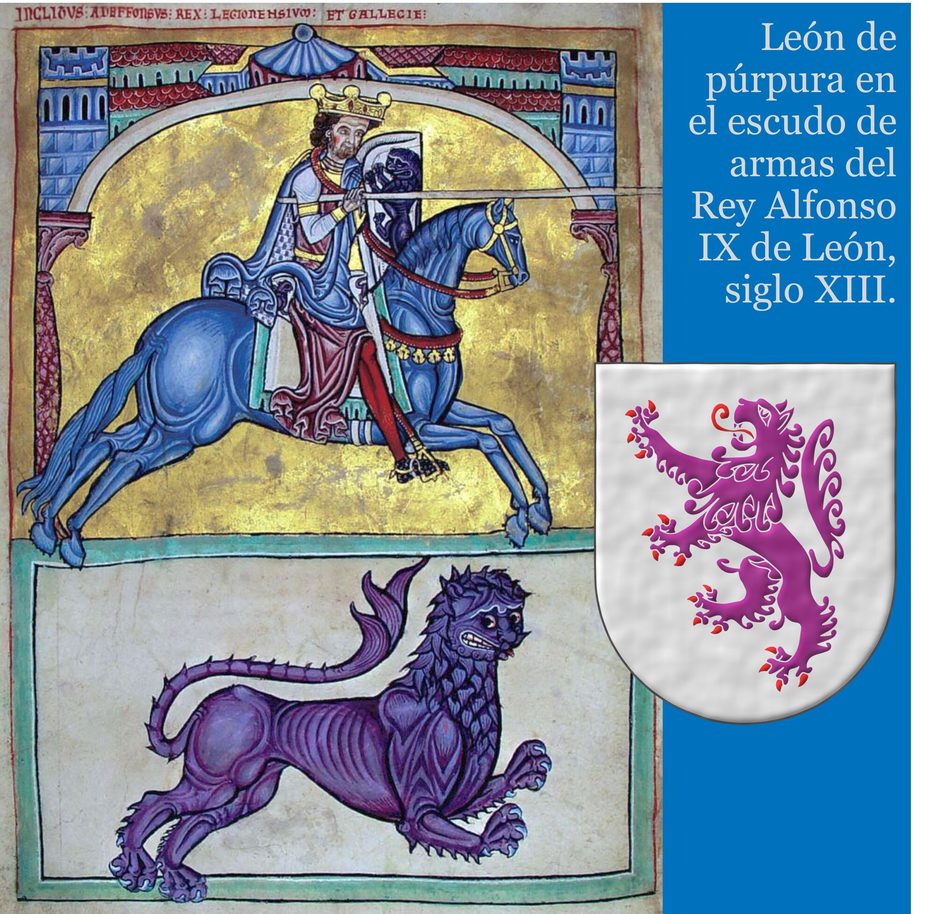
![Berenguela of Castile and Alfonso IX [ Argent, a lion rampant Purpure, armed and langued Gules ] accolé with [ Gules, a castle triple towered Or, port and windows Azure, masoned Sable ].](../escudo_armas/BerenguelaC.23.Matrimonio.jpg)